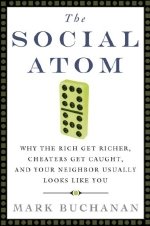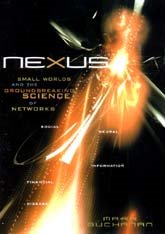I'm going to have some more to say on the issue of the polarization of opinions, which I wrote about a little last week. Cass Sunstein emailed me with some insightful comments I'd like to share, but I first have to read and digest a couple papers he sent me.
Meanwhile, check out some new work that brings out in a disturbing way how the apparent consensus of a group can be strongly influenced by the loudest members. Suppose you go around and talk to the students in some class, listen to their opinions, and then later try to give an impression of the distribution of opinions within the group. Clearly you do better in terms of accuracy if you hear from lots of people, and so sample the group in a reasonably fair way.
But psychologist Kimberlee Weaver of Virginia Tech and colleagues found that real people don't form their views this way. Rather, if we encounter one person, repeatedly, who voices the same opinion many times, we tend to weight that opinion more strongly, even though it is obviously just one person's opinion. They found that if one person voiced an opinion, say, three times, it ended up being counted almost as much as if the opinion were voiced separately by three different people. The reason our minds do this, the researchers suspect, is that "the more often an opinion has been encountered in the past, the more accessible it is in memory and the more familiar it seems when it is encountered again." You can read the full paper here.
The conclusion is worrying: "repetition of the same opinion gives rise to the impression that the opinion is widely shared, even if all the repetitions come from the same single communicator."
This psychological propensity clearly feeds into the problem of "pluralistic ignorance," which I touched on in one of my New York Times essays. Unfortunately, our instincts for assessing what "most people think" can easily be led astray, especially by a powerful (and often less than responsible) media.
Tuesday, July 10, 2007
Winning by repeating -- Mark Buchanan
Posted by
Mark Buchanan
at
4:59 AM
![]()
Labels: automatic, consensus, deliberation, extremists, mechanical, opinions, psychology

Subscribe to:
Post Comments (Atom)



2 comments:
And there's always the sheep factor, also known as lemmingitis.
"Unfortunately, our instincts for assessing what "most people think" can easily be led astray, especially by a powerful (and often less than responsible) media"
No kidding. Today Andrew Sullivan linked to a real-world example of the repetition principle at work. The media has been going on and on that Bush commuted Libby's sentence due to "pressure" from his base. One imagines that the size of the base must be reasonably large--perhaps that 27% of the nation who still approve of Bush.
But no! A Gallup poll finds the size of the base to be a mere 6%...Six per cent! Sullivan's conclusion: "The base" is often a fiction for cliques in Washington whose constant goal is to defend their own privilege and power" ....and, who, evidently, keep whispering into the president's ear.
Post a Comment